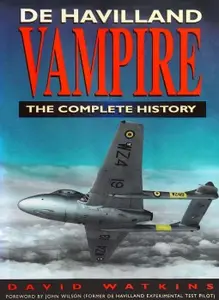
Free Download David Watkins – De Havilland Vampire: The Complete History
Sutton Publishing | 1996 | ISBN: 0750912502 | English | 296 pages | PDF | 207.26 MB
The de Havilland Vampire was the second of the RAF’s first-generation post-Second World War jet fighters to enter service. This twin-boom fighter began life as an interceptor but was soon re-tasked in the day fighter/ground-attack roles with the 2nd Tactical Air Force in Germany from 1948 to 1954, and with the RAF’s Middle and Far East Air Forces.
In addition to playing a full part in the RAF’s battle order during the 1940s and ’50s, the Vampire also served with the Fleet Air Arm and quickly became an export success story for the British aircraft industry with hundreds of aircraft sold to dozens of foreign air forces world-wide. For a short spell during the early 1950s the Vampire formed the backbone of the RAF’s nightfighter force and, importantly, between 1952 and 1967, the Vampire trainer was responsible for a steady flow of trained pilots for the RAF, Royal Navy and foreign air forces.
Throughout its 46-year career, the Vampire has collected many notable firsts: the first jet fighter to cross the Atlantic, the first jet to land on an aircraft carrier, and the first jet trainer on which student pilots actually qualified for their ‘wings’. David Watkins’ history is comprehensive and covers the Vampire’s development and operational service. It has been written with the full cooperation of the manufacturer, the MoD, RAF and other world air forces, mixing narrative and technical detail with vivid personal accounts from pilots and ground crews. Comprehensive appendices include RAF and FAA Vampire squadrons, technical specifications, production details, serials and export details.
De Havilland Vampire: The Complete History is illustrated throughout with a varied and interesting selection of photographs and line drawings, many previously unpublished. By correcting many of the errors previously written about the Vampire, it will appeal to historians and everyone with an interest in the RAF and its early jet aircraft, not to mention those who actually served in the RAF at its postwar peak during the 1950s.










Leave a Reply
You must be logged in to post a comment.